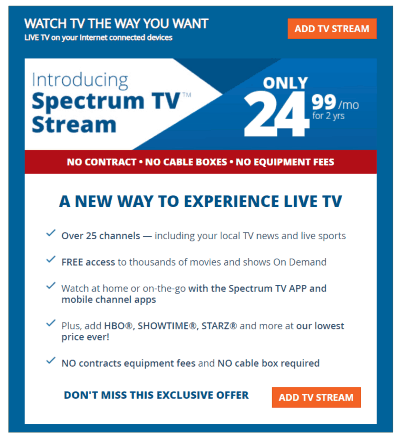Spectrum customers in some highly competitive service areas are being offered more discounted services than ever before, including a $20 Lifestyle TV package with 50+ cable networks and local channels can be bundled with up to 200 Mbps internet access for $59.98 a month for 12 months (not including the $11.99/mo Broadcast TV Fee).
Spectrum Lifestyle TV ($19.99/mo) includes all local TV channels, plus:
 AMC
AMC- MSNBC
- Arts & Entertainment
- Cartoon Network
- CNN
- SyFy
- Discovery Channel
- EWTN
- E!
- Inspiration
- Food Network
- ION
- Freeform
- TBN
- FX
- WGN America
- Hallmark
- BET
- Hallmark Movies & Mysteries
- TV Land
- HGTV
- VH-1
- Lifetime Channel
- OWN TV
- Oxygen
- BET Jams
- Spectrum News
- BET Soul
- TBS
- Nicktoons
- TLC
- TV One
- TNT
- BET Her
- USA Network
- Aspire
- Lifetime Movie Network
- Revolt
- History Channel
- The Africa Channel
- Animal Planet
- The Impact Network
- Spike TV
- Nick Jr.
- Comedy Central
- Teen Nick
- Bravo
- The CW
- Disney Channel
- StarzEncore Black
- Travel Channel
Customers can use their own equipment, such as Roku, Apple TV, desktop, or apps for iOS and Android, or rent traditional Spectrum set-top boxes for $7.50/mo each (add $4.99/mo to enable DVR service for one box or $9.99/mo for two or more boxes).
Spectrum’s traditional bundle promotion consists of up to 200 Mbps internet and Spectrum TV Select (125+ channels) for $89.98 a month, not including the $11.99/mo Broadcast TV Fee, so the stripped down Lifestyle TV bundle offers about $30 a month in savings.

Spectrum TV Stream is offered to cord-cutter/internet-only customers, but Lifestyle TV me be a more compelling deal.
If you want the Lifestyle TV package but want more channels, you can still save with this promotion by upgrading to the TV Silver package (175+ channels and HBO, Showtime, and the NFL Network) for $20 a month more, which is $25 less a month than what the traditional Double Play TV Silver and internet bundle costs.
Package Comparison (both offers include the same channel lineup and internet package)
- Lifestyle TV Promo: $19.99 Lifestyle TV + $39.99 internet + $20 TV Silver Upgrade + $11.99 BTV Fee = $91.97
- Traditional Double Play Promo: $44.99 Standard TV + $44.99 internet + $20 TV Silver Upgrade + $11.99 BTV Fee = $121.97
Stop the Cap! has confirmed this promotion is running in some AT&T service areas in the southern United States, especially Texas. You can confirm eligibility by visiting Spectrum.com and entering your street address, request to get pricing for new service, and selecting an internet-only package. The Lifestyle TV promotion will appear on the order page as a bundle option if you are qualified for the offer. Spectrum may offer you its other TV add-on packages, notably TV Stream ($24.99/mo), which is a less compelling streaming option with fewer channels at a higher price.
These offers and pricing are for “new customers only.” If you are a current customer, you can return your equipment at a Spectrum Cable Store location to cancel service without dealing with customer retentions, and then sign up as a new customer through the Spectrum website under the name of another family member or friend. Select self-install/pickup equipment in-store and you can get service under a new account on the same day. Otherwise, you must disconnect service for 30 days before qualifying again as a new customer. Depending on how much competition exists in your area, pricing and promotions can vary. Customers may find promotional pricing locked in for 12, 24, or 36 months depending on how much Spectrum is fighting to win customers in each area. Be sure to look out for free upgrades, particularly to 400 Mbps internet service, which is being offered in some areas.


 Subscribe
Subscribe Officials in the Justice Department are asking T-Mobile and Sprint to spin off a portion of their networks to lay the foundation to create a new national wireless carrier, with its own network, as a deal condition for approving their $26.5 billion merger.
Officials in the Justice Department are asking T-Mobile and Sprint to spin off a portion of their networks to lay the foundation to create a new national wireless carrier, with its own network, as a deal condition for approving their $26.5 billion merger. Staffers working for the antitrust division of the Department of Justice have recommended the agency sue to block the merger of T-Mobile and Sprint, arguing it will reduce competition and raise prices for consumers.
Staffers working for the antitrust division of the Department of Justice have recommended the agency sue to block the merger of T-Mobile and Sprint, arguing it will reduce competition and raise prices for consumers.
 T-Sprint’s argument is that this transaction will accelerate the deployment of 5G technology in a war for 5G supremacy with China. But exactly what technology is deployed, on what spectrum, using small cells or macro cell towers, makes a lot of difference. China’s wireless companies are owned and controlled by the Chinese government, which is also underwriting some of the costs. America’s networks are financed with private capital (and customer bills). T-Sprint’s 5G plans are also far less ambitious than those from AT&T and Verizon, and the cost to long-term competition is too high. The FCC should know that.
T-Sprint’s argument is that this transaction will accelerate the deployment of 5G technology in a war for 5G supremacy with China. But exactly what technology is deployed, on what spectrum, using small cells or macro cell towers, makes a lot of difference. China’s wireless companies are owned and controlled by the Chinese government, which is also underwriting some of the costs. America’s networks are financed with private capital (and customer bills). T-Sprint’s 5G plans are also far less ambitious than those from AT&T and Verizon, and the cost to long-term competition is too high. The FCC should know that. WASHINGTON (Reuters) – T-Mobile US Inc’s $26 billion acquisition of rival Sprint Corp won the support of the head of the Federal Communications Commission on Monday, in a big step toward the deal’s approval.
WASHINGTON (Reuters) – T-Mobile US Inc’s $26 billion acquisition of rival Sprint Corp won the support of the head of the Federal Communications Commission on Monday, in a big step toward the deal’s approval.
